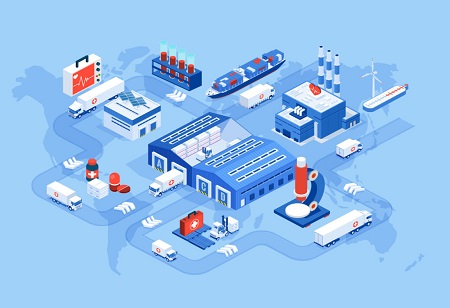Abhrasnata Das | Sunday, 08 May 2022

Pharma supply chain has always been recalled as the most complicated and strained network amongst all. Indeed, with multiple stakeholders lying at different levels, pharma supply chain management is a herculean task in itself. When Covid pandemic emerged, the first point of fear was that, how long will it be before this fragile and complex chain breaks apart and falls down into bits and pieces.
However, in practice, it has proved remarkably resilient with drug shortages kept to a minimum. The global pharma industry has always been an early adopter of tech. Whether it be drug formulation, operational efficiency or supply chain network, technology has become ubiquitous. Further, with the introduction of IoT in the pharma supply chain, it is now even possible to track a shipment like a shadow throughout the timeline. That being said, let's take a note on how technology is opening up new avenues for the pharma industry to battle the existing supply chain challenges.
Effective Shelf Management Pharma faces several difficulties — product unavailability due to expiration or transport-related delays, unavoidable overstocking so that a particular product is never out of stock, resulting in a higher working capital expenditure, and other issues such as spoilage, product recalls, theft, damage, and loss. However, technology is helping the firm to leap forward in this situation. “With better visibility into your supply chain, you will have an unbroken chain of data that not only means just information, but also leads you to meaningful analysis of the situation and better, as well as timely decisions,” says Shaukat Ali, PhD; Technical Support Manager at Pharma Solutions. The global pharma giants have already matched a long way forward in this.
For example - Mecalux a Spain based entity has built Mega Pharma, a new automated clad-rack warehouse in Uruguay with a capacity of over 6,900 pallets. It consists of two double-depth storage aisles and a conveyor circuit for inflowing and outflowing goods. The entire operation is controlled and managed by the Mecalux Easy WMS warehouse management software. This in turn has helped Mecalux to increase the capacity at a massive rate with minimum throughput and more efficient management.
To Fight the Counterfeiting Drug Counterfeiting is one of the biggest challenges that the global pharmaceutical industry faces. Through the years, there have been a lot of efforts to keep pharma supply chains in check for mishaps like drug counterfeit and theft, including increased government regulations — QR codes, holograms, RFID tags, blockchain. But counterfeit drugs are still one of the most perilous things that the pharma industry has to deal with. A report by the World Health Organization suggests that 1 out of every 10 products in the worldwide drug market is counterfeit.
“The problem of counterfeit drugs undermines the painstaking efforts that are put in to ensure that the end user or patients receive a product that is safe and manufactured with the highest standards of quality excellence,” states Sharvil Patel, Managing Director of Cadila Healthcare. To fight counterfeit, the firm introduces secret scratch code for crucial drugs to help patients ensure that the product is not fake or counterfeited. The company notes that it has incorporated a new IT-enabled scratch code that will be printed under a scratchable surface. The patients can check to see if the product purchased by them is genuine or not by scratching the surface and verifying the code through the app or the website.
Dealing with Cold Chain Logistics The IQVIA Institute for Human Data Science has estimated the losses by pharma companies to be about $35 billion. Handling a cold chain is a different ball game altogether. There’s much more to cold chain monitoring than just having a data logger report. Not acting on time can go beyond compliance issues, it can lead to issues with distribution due to goods being rejected.
For years the industry has been using active or passive data loggers to get information about the cold chains, but it’s not been enough to prevent compliance issues cascading into supply chain disruptions. “When it comes to the life sciences industry, the key challenge lies in how a company provides assurance when it is transporting drugs, biologics, vaccines over long distances, or complicated routes?” notes Ranjeet Banerjee, CEO of Cold Chain Technologies. To overcome this situation, the company has developed an AI based path platform that uses data to understand the ambient condition, in which a drug, or vaccine can be stored. Hence, the product will always be in optimum condition even if any problem persists and the product reaches late than the stipulated time.
Thriving Pharma Supply Chain The role of technology has been critical in transforming the pharma supply chain into a robust network. Starting with AI, ML to IoT advanced technologies is not only pacing up the supply chain network but also giving fruitful insight, that will further help the industry to the problems of the future. That being said, in the near future it will be interesting to note how the pharma industry brings in other advanced technologies like robots, drones and transits towards a resilient future.